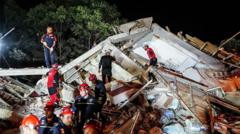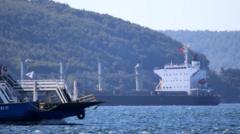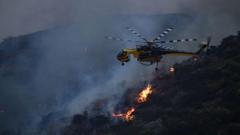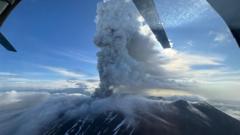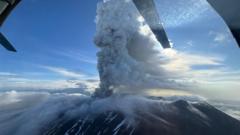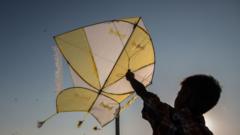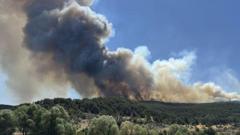Mount Lewotobi Laki-Laki in Indonesia has erupted, sending ash clouds high into the atmosphere and prompting emergency measures as officials urge for the safety of local communities.
Indonesia Issues Highest Alert as Mount Lewotobi Laki-Laki Erupts
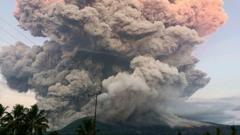
Indonesia Issues Highest Alert as Mount Lewotobi Laki-Laki Erupts
Mount Lewotobi Laki-Laki erupts, raising concerns for nearby residents and air travel.
Mount Lewotobi Laki-Laki, one of Indonesia's most volatile volcanoes, erupted dramatically on Tuesday at approximately 17:35 local time, releasing an ash plume that soared over 11 kilometers. This eruption prompted the country's volcanology agency to issue its highest alert level in response to the growing threat.
The eruption occurred above the picturesque island of Flores and has resulted in a 7-kilometer exclusion zone being established around the volcano's summit, which stands at 1,584 meters (5,200 feet). Fortunately, reports of damage and injuries have yet to emerge, but the looming threat remains.
This isn’t the first time Lewotobi Laki-Laki has erupted; it experienced a series of eruptions in November last year that tragically resulted in nine fatalities and led to mass evacuations in the surrounding areas. It also disrupted air travel due to the considerable ash cloud.
Authorities, led by Muhammad Wafid from the geology agency, emphasized that all activities within the exclusion zone are strictly prohibited. A warning has also been issued regarding possible lahar floods—mudflows or debris torrents resulting from volcanic activity—especially if heavy rains occur.
To protect themselves from ash fall, locals have been advised to wear face masks, and the National Disaster Mitigation Agency has confirmed that at least one village has already been evacuated. Additionally, ash rain has affected several communities beyond the exclusion zone.
As volcanic tremors persist, residents in the vicinity have been urged to relocate to safer areas. Interestingly, Lewotobi Laki-Laki is paired with the taller and calmer Perempuan, which translates to "woman" in Indonesian. The contrasting dynamics of these twin peaks symbolize both the beauty and danger of nature in the region.

